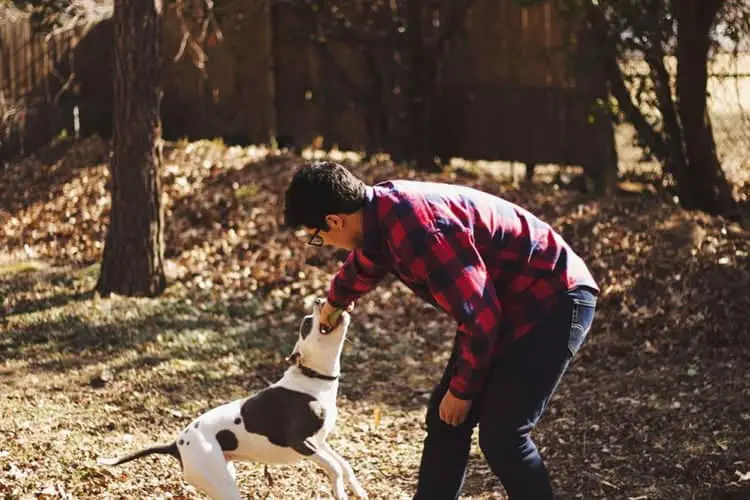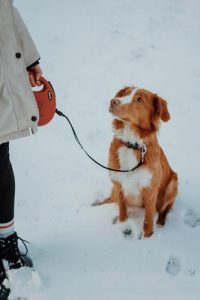It isn’t often that my owners have to leave me. But it does happen. Maybe they have to take a trip for work or decided to take a family vacation, whatever the reason may be, there are those times when they can’t take me with them. It’s not the easiest thing for me to have to deal with, and as I’ve gotten older, I’ve learned to deal with it better. When I was younger, it was very stressful sometimes, mostly because I was confused about what was going on. But my mom and dad always had someone wonderful taking care of me, which helped a lot. It’s not always easy for someone to take care of a confused and anxious puppy, so I thought it would be a good idea to put together some helpful tips to help those who may find themselves puppy sitting, being for a day or a week.
1. Do Some Research

Doing some research about the puppy you are about to take care of can go a long way towards making it a pleasurable experience for both of you. Every breed of puppy is different, and how they have been trained can make them different from others of their breed. Are they a high energy pup, or would they rather hang out and keep it low key? Are they leash bound, or have they been trained off-leash? However minor some things may seem, they may not seem so in the moment. After doing a little research on the breed itself, ask the owner some questions. The more you know, the better things will be. Ask about feeding schedules, what the pup needs for exercise, and whether there is anything they are afraid of or they don’t like. You also need to know if they tend to run away if given the opportunity or have any allergies. There is no such thing as a bad question when trying to learn more about the puppy you are about to spend some time with.
2. Know Your Limitations
Puppies can be unpredictable, and therefore so to can puppy sitting. You must know what you are capable and willing to do because, at any given moment, we as dogs can throw our humans for a loop. Are you comfortable giving the puppy medication if need be? (We’re not exactly co-operative when it comes to having to take medication, especially if it’s from a stranger.) Do you know what to do if the puppy runs away, and are you willing to spend the time chasing them down? (It can quickly become a fun game for us but can be extremely frustrating for you.) What happens if the puppy hurts themselves while out on a walk and needs carried? Are you capable of picking them up and taking them home? (This can also apply to those stubborn ones that will suddenly give up on walking.) Knowing your limitations can help you get out of some less-than-ideal situations or can help you avoid them together.
3. Consider the Financial Aspect
The money side of puppy sitting is something that almost nobody even thinks about. We don’t expect to spend money on a puppy we are taking care of, but unexpected expenses can happen. Maybe your puppy sitting for an extended time, and you’ve run out of food, or the puppy has hurt itself or gotten sick and needs to go to the vet. While most responsible dog owners will leave a little reserve cash for their puppy sitter, it may not always be enough to cover what is needed. Are you willing or able to cover that added expense until our owners return? Talking about money can sometimes be an uncomfortable topic, but it’s important to ask the owners some questions. Find out if they intend to leave some money for emergencies or if they will pay you back for any unexpected bills when they get home. Money is often something that neither the puppy sitter nor the owners consider until the puppy sitting is over, and then the conversation can sometimes become even more uncomfortable.
4. Know the House
Because we’re most comfortable in our environment, our owners will often ask to have us taken care of in our own homes, at which point you also become a house sitter. Knowing the layout of the house and where everything is makes things easier for both your and the puppy’s well-being, but there are other things that you may want to consider as well. Will anyone else is at the house, like family members or neighbors or housekeepers, have a key? Are the owners expecting any repair people while away? It’s not only important to keep the puppy safe but to keep yourself and the house safe as well. Knowing who can and can’t be on the property while the owner is away goes a long way in doing just that.
5. Be Organized

Puppy sitting can be, and often is, chaos. Being an organized person can help to combat the chaos. Keeping track of things like schedules, routines, and contact information can go a long way towards keeping the craziness to a minimum, especially when taking care of more than one puppy at a time. Sure, there are things beyond your control, but staying organized will help elevate the stress of dealing with those things that are not. There are also some things that the puppy may need at a moment’s notice, like toys, food, and even their bed. Try keeping that stuff as organized as possible so that you’re not running around the house searching for it.
6. Meet Your New Friend Before It’s Time to Puppy Sit
Whether you know the puppy you are sitting or not, you will be friends with them, it’s in our nature to make new friends. If you don’t know the puppy yet, make sure that you spend some time getting to know them. When the time comes, knowing the puppy will make things a lot easier for both of you. Think of how stressful it must be for a puppy to have a stranger come into their house to stay with them. They have no idea what is going on. But if they’re already friends with you, this will matter a lot less, and they will be a lot more comfortable. Go and visit. Spend a couple of hours taking the puppy for a walk or playing with them; bonding. Do this a few times before the big day, and the entire experience will be much better.
7. Stick to the Puppy’s Routine
Having our owners leave isn’t a pleasant thing, even if we’re comfortable with whomever it is taking care of us. It’s confusing and hard for us to understand, which can easily lead to stress and anxiety. Routines give us a sense of normalcy in a world that feels as if it has been turned upside down. Just like humans, we’re used to having routines. Whether it’s when we get fed or what time we go for a walk, consistent routines are a big part of our life. That routine will help to keep us grounded and make our short time together much more pleasurable.
8. Be Prepared for Some Unusual Behavior
I know I’ve already mentioned how stressful being left in the care of someone who is not our owner can be. Separation anxiety can be a big deal for us. We are pack animals, after all. Not being with our pack can be stressful, which leads to us behaving abnormally. It can be as simple as wandering around the house looking for our owners, maybe crying every once in a while, or it can mean that we start acting out by becoming destructive or having accidents inside. It’s our way of dealing with stress. We can usually deal with short periods of separation, but as that period grows, so too can our stress levels. A puppy sitter who knows how to handle that situation goes a long way in keeping us calm. A good way to combat some of this anxiety is by having a safe place prepared for us where we can go to escape. A bed or a crate that we love or an area in the house where we can find our favorite toys goes a long way in keeping us comfortable, and it reduces the chances of us acting out in strange ways.
9. Stay Calm
It’s easy for that added stress in a puppy to become added stress for the puppy sitter. Puppies are very intuitive animals, and if their sitter is stressed, it’s only going to increase their stress levels. Stay calm, even if we are pushing you to your limits. Not only will a puppy sitters calmness help the puppy stay calm, but it will also help you to manage emergencies much better. If our sitter is freaking out and losing their cool, we will quickly pick up on that and start losing our cool as well, possibly making an already trying situation even worse. Staying calm goes hand in hand with being organized and having a plan for things like unexpected vet visits, unexpected costs, sickness, or even dealing with us running away will help you stay calm under duress.
10. Don’t Forget Our Owners
Yes, this can be a stressful time for a puppy, but let’s not forget that it can be a stressful time for our owners as well, especially if it’s something they’ve never had to do before. Stay in touch with them the entire time you’re puppy sitting. There will be times when they call and check-in, reassuring themselves that everything is fine. People want to know that their pup is in good hands while they are not around. But it can go beyond them making a call to check-in. Don’t wait for them to reach out to you. Reach out to them. Give them a call. Let them know that things are great. Send them some pictures of the fun you are having with their puppy, or make some social media posts that they can easily access while away (always make sure that they are ok with you doing this before you do). Things like this don’t just assure them that their puppy is ok, but it also shows that you care and let them know that their puppy is in good hands.
Pet sitting can seem like a scary thing at the time, and there is nothing wrong with that. Don’t feel bad if you get overwhelmed at times. Everyone does. After all, it’s a big responsibility to take care of someone else’s beloved family member. And don’t be afraid to admit that you may not be the right fit for the job. I’m sure a puppy’s parents can appreciate the honesty and would rather know that ahead of time than discovering it in the middle of their time away. If you are up to the task, though, it can be a great time for both you and the puppy. I hope that these tips help make it a great experience and maybe even a lifelong bonding experience.